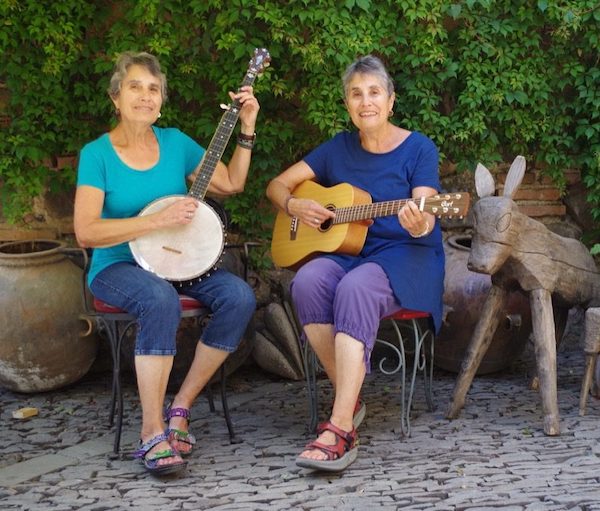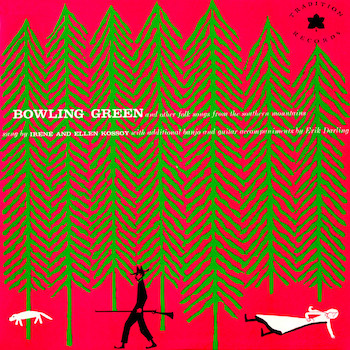Music Interview: The Return of the Kossoy Sisters
By Noah Schaffer
The Kossoy Sisters’ last area performance was at the 2012 Newport Folk Festival. Now living in Guatemala, the pair are back for a Saturday matinee appearance at Club Passim.

The Kossoy Sisters — back in Boston for a Saturday matinee appearance at Club Passim. Photo: courtesy of the artist
While the Kossoy Sisters’ moving harmonies and mastery of old-time ballads have stood the test of time, the twin sisters themselves have been anything but overexposed.
They performed at the very first Newport Folk Festival and, before that, at the 1956 “Bound for Glory” tribute concert for an ailing Woody Guthrie. They never stopped singing, though they have largely avoided the commercial music route. In 1956 they recorded their debut album, Bowling Green and Other Folk Songs From the Southern Mountains. They waited until 2002 before releasing the follow-up, Hop On Pretty Girls.
That didn’t stop a new generation from discovering them via the film O Brother Where Art Thou?, which included their version of “I’ll Fly Away.” The pair’s last area performance was at the 2012 Newport Folk Festival. Now both living in Guatemala, Irene Saletan and Ellen Christenson are briefly back for a Saturday matinee appearance at Club Passim, which also includes an opening set by the remarkable Guatemalan singer Mercedes Escobar, who mixes blues, country, and Latin influences.
The Arts Fuse spoke with Irene and Ellen via Zoom.
The Arts Fuse: How did you end up in Guatemala? What’s your life like there?
Irene Saletan: We decided we were sick of snow and shoveling, and we were retired, so it seemed like a good time to leave.
Ellen Christenson: We get to go walking and go outdoors every day. We have dogs and we walk them a few times a day. The time just goes! And that’s how we met Mercedes, from living in Antigua and playing music there, and she would play concerts and we got to be friends. Now she lives here in our [Boston area] house when we’re away in Guatemala so she can go to Berklee, so it’s a good arrangement! She’s very versatile and everything she does she does well. This concert is a benefit for Fotokids, which was started 30 years ago by Nancy McGirr. She was covering the war in El Salvador and got sick of taking photos of dead bodies and wanted to leave. She moved to Guatemala. There she found kids who make their living picking through garbage dumps and selling anything salvageable. So she started an organization to show them how to take photos. There are now hundreds of children involved and they do the most amazing photography imaginable.
AF: These days, anyone interested in learning about and singing traditional Appalachian ballads can find just about all of them online. Of course, that wasn’t the case in the ’50s. How did you come across these tunes? Do you remember when you first heard some of your trademark songs, like “I’ll Fly Away?”
Saletan: We lived in New York City and we used to go down to Washington Square Park where people would gather around the fountain and form little clumps of groups, and sing from one to another and play music. We learned the music from people who took us aside and gave us tapes…
Christenson: We had reel to reel tapes…
Saletan: And we were also listening to the wonderful Folkways compilations as well as recordings put out by the Library of Congress. But we learned so many songs during that time it’s hard to pinpoint any moments when we first heard any of them.
 AF: Besides singing you also played banjo and guitar. Did anyone in the folk world suggest that girls shouldn’t be playing instruments?
AF: Besides singing you also played banjo and guitar. Did anyone in the folk world suggest that girls shouldn’t be playing instruments?
Christenson: No, but there weren’t very many girls singing back then.
Saletan: Mary Travers used to hang out in Washington Square Park. There were a number of interested women, but they weren’t hanging out there. We eventually got to meet some of them through other people at parties. [The Washington Square Park scene] is how we met Erik Darling [who is featured on the first Kossoy Sisters record]. He used to accompany a lot of people, including Ed McCurdy, who was a Canadian living in New York. Ed wrote a lot, including the song “Last Night I Had the Strangest Dream,” and he had an album When Dalliance Was in Flower (and Maidens Lost Their Heads), which were double entendres! Ed, Erik, and us wound up doing some concerts together around Greenwich Village.
AF: You were part of a major tribute concert to Woody Guthrie called “Bound for Glory” in 1956. How did that come about? Did you meet Woody, who was still alive at that time?
Christenson: Maybe it was through Millard Lampell, who wrote the script for the concert? That was the first time we met him. He had been hospitalized, but he was still able to come and be backstage at that concert.
Saletan: We met Woody a few times after that. He had very little physical control over his body, and his speech was slurred. But he was still pretty sharp in a lot of ways. There are some photos around out there of us singing with him. At that point he really couldn’t play, but he was watching and enjoying
Christenson: He came to one of our concerts with Erik and we didn’t know he was there. Someone was hooting and hollering after every song and we realized it was Woody. We were so excited!
AF: Many of the people you were singing with back then continued on as full-time performing and recording artists, and the Kossoy Sisters didn’t. Why not?
Saletan: Well we were still in high school and college…
Christenson: And we weren’t living in New York anymore. I got married right after college and moved to St. Louis with my husband, so we just didn’t do much performing anymore.
 AF: Irene, you continued to perform around New England and record with your husband Tony. One of the stranger releases in your discography is an EP of New England folk tunes that was recorded for the Boston Mutual Life Insurance Agency. How did that come about?
AF: Irene, you continued to perform around New England and record with your husband Tony. One of the stranger releases in your discography is an EP of New England folk tunes that was recorded for the Boston Mutual Life Insurance Agency. How did that come about?
Saletan: [Laughs] I don’t remember that at all! Really? We did concerts for all kinds of weird groups. I remember once we did one for a shoe convention. Some local company had put out a hootenanny sneaker. So some bright guy decided it’d be wonderful to have us singing at the convention as people moved through their exhibit. The hootenanny sneakers were these ugly things with fringes on them. But no one was listening to us, they were just looking at each other’s feet! So we made up songs about hootenanny sneakers.
And another time we sang for a Boy Scout jamboree in Rhode Island. We had to follow a woman who had been elected Miss Rhode Island, or something like that. So here was this beautiful girl in front of all these horny boys and we had to follow her! That was hysterical. But I don’t remember recording for an insurance agency.
AF: You were also in a group with Jackie Washington…
Saletan: Jackie was great, we’re still friends. He’s doing some singing. He used to sing with my husband and myself as a trio called the Boston Folk Trio — a very original name there! And we’d do school concerts for a group called Young Audiences, and they’d usually get us jobs in places like schools. One time they had us perform at the Shirley Correctional Institution. We came out to the show and all these guys were sitting in front of us wearing their prison uniforms, looking like they were wondering, ‘What are they pushing on us now?’ But Jackie could get anyone loosened up. One of the songs we sang was written by Pete Seeger, “One Man’s Hands”: One man’s hands can’t tear a prison down/Two men’s hands can’t tear a prison down/But if two and two and fifty make a million/We’ll see that day come round.” Well we sang it and they went wild! Jackie was hamming it up and we were having the best time singing with him.
AF: Have any of the songs that you sing changed their meaning to you over the years?
Christenson: “Farther Along,” is one. Now I think of it as a political song rather than a religious song. We still like it. We still sing a lot of the songs now that we sang back then, because they’re wonderful songs.
Noah Schaffer is a Boston-based journalist and the co-author of gospel singer Spencer Taylor Jr.’s autobiography A General Becomes a Legend. He also is a correspondent for the Boston Globe and DigBoston, and spent two decades as a reporter and editor at Massachusetts Lawyers Weekly and Worcester Magazine. He has produced a trio of documentaries for public radio’s Afropop Worldwide, and was the researcher and liner notes writer for Take Us Home – Boston Roots Reggae from 1979 to 1988. He is a 2022 Boston Music Award nominee in the music journalism category. In 2022 he co-produced and wrote the liner notes for The Skippy White Story: Boston Soul 1961-1967, which was named one of the top boxed sets of the year by the New York Times.
